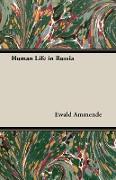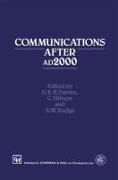Human Life in Russia
BücherAngebote / Angebote:
HUMAN LIFE IN RUSSIA BY DR. EWALD AMMENDE PREFACE FOR the last fifteen years the author has championed this view that the rendering of assistance to those inhabitants oi Russia who are in danger of death from hunger or malnutrition is a problem which concerns the whole of civilized mankind and does not depend on political factors. Nor ought it to be affected by the views held with regard to the Communist experiment within the Soviet State, or by the achievements which characterize onq department or another of Russian life. As early as November 1920 I published a description of the situation in the former capital, St. Petersburg, where the population was suffering from famine, coupled with an appeal for help. In the spring of 1921, on returning from a long stay in Russia, I was one of the first to raise my voice and to point out, on the strength of personal observation, that millions of people in the Volga basin were in danger of famine. Later, when the extermination of the socalled kulaks began in Russia, I wrote to the press, and for the last two years, as Honorary Secretary of the Interconfessional and Inter national Vienna Relief Committee for the Russian Famine Areas, I have been trying to solve the problem of how to bring to the attention of the world the position of millions of innocent people who have been dying in vast numbers since the collectivization of agriculture began. The aim of this book is to make the truth known despite all obstacles, in order that adequate relief may be rendered, How does it come about that I have been dealing with this question for so long a time? This question must be answered in detail, since anyone attacking the question of the famine and the mortality it has caused during the last few years runs the risk of aspersion and denunciation, or at any rate is felt to be a disturber of the peace by many who are jpurstrog political and economic aims. I must therefore ask leave, before entering on my theme proper, to give a brief account of myself and my activities in this question. By good fortune I was able, in my student days, to visit almost every part of the vast Russian Empire, of which I was a national until the republic of Estonia was founded. In 1913 a journey of investigation took me into certain parts of the basins of the Volga and the Kama, where I had, in connection with a scientific thesis on which I was working, to study the position of the peasants as producers in the Russian grain trade. During this journey I had to cover hundreds of miles by sleigh in winter and by river in summerfor even today there are hardly any railways east of the Volga. This journey was a veritable revelation. The impression which I formed at that time in the villages of East Russia, in the provincial towns and in the great centres along the Volga, through immediate contact with the peasants, the boatmen, and the merchants, who owned dozens of vessels and an extensive system of branches on the various rivers, may be summed up thus.
Folgt in ca. 10 Arbeitstagen




